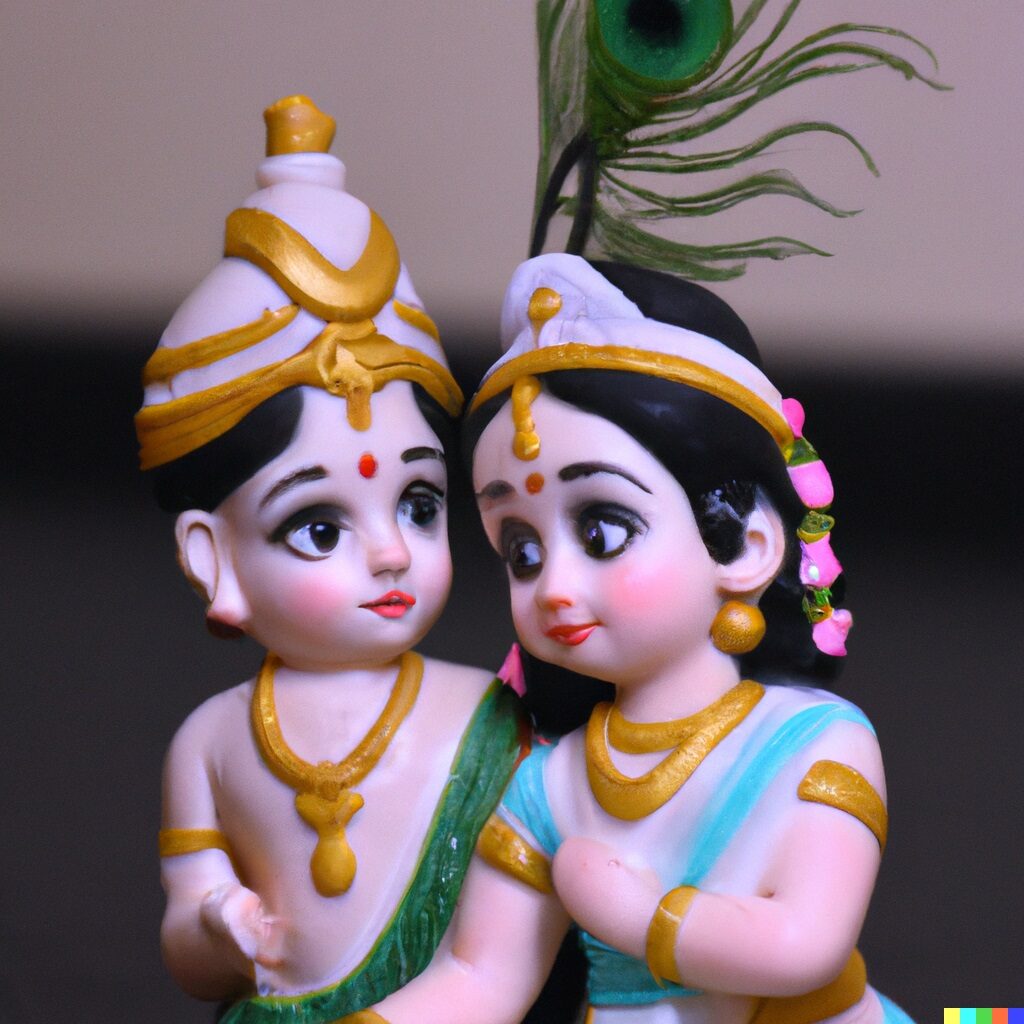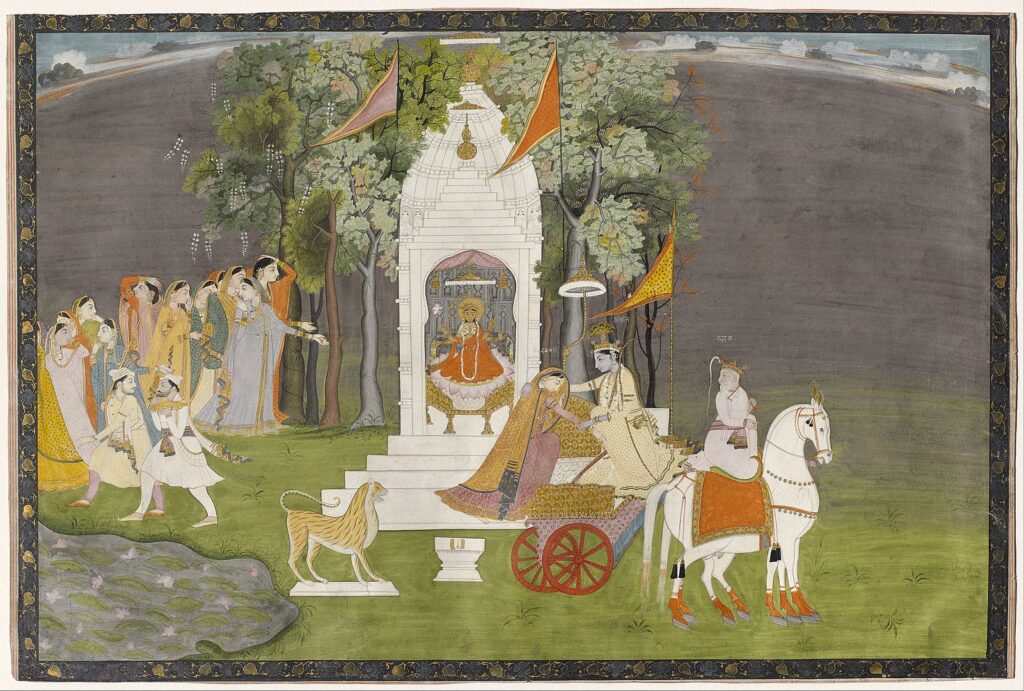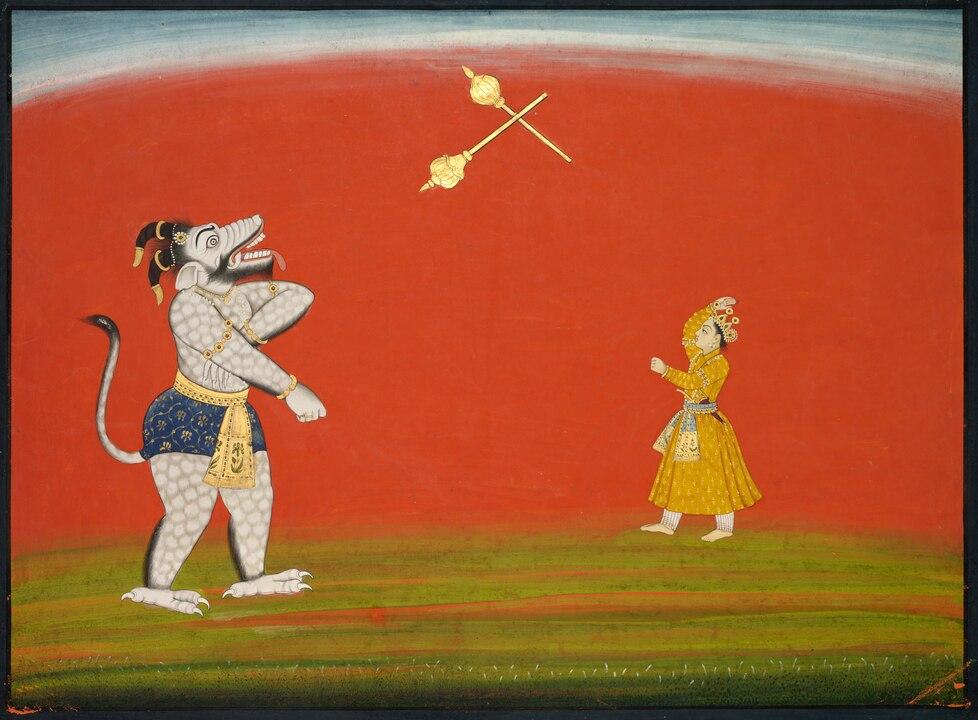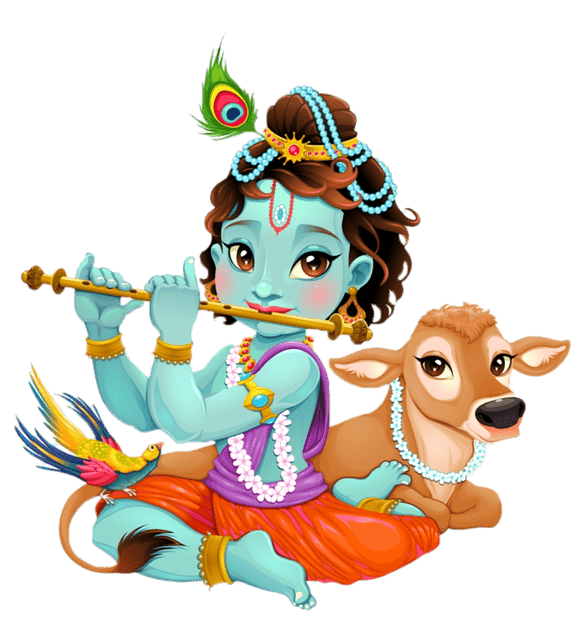
Krishna’s marriage to 16,108 wives is a fascinating fact, with each wife purportedly giving birth to 10 children, each bearing some resemblance to Lord Krishna. However, despite the large number of wives, there were only 8 queens among them. This prompts the question of how many sons Lord Krishna actually had. This discussion will revolve around the 80 sons that were born to the 8 queens. Lord Krishna had 8 queens, namely Rukmini, Satyabhama, Kalindi, Lakshmana, Bhadra, Nagnajiti, Jambavati, and Mitravinda. In this article we shall discuss the names of the 80 sons of Krishna that were born to them.
Krishna is also referred to as ‘Bhagavan Swayam’ in Srimad Bhagavatam, thereby implying that He is the source of all avatars (incarnations) of Godhead. Krishna is ‘Svayam rupa’ or the original supreme personality of Godhead, and is also referred to as ‘puskala’ or the most complete. He has innumerable names, describing His various qualities, pastimes and incarnations.
Ete camsa kalah pumsah krsnas tu bhagavan svayam
Indrari vyakulam lokam mrdayanti yuge yuge
(Srimad Bhagavatam 1.3.28)
–
All these incarnations are either plenary portions or portions of plenary portions of the Supreme Lord, but Lord Krishna is the original Supreme Personality of Godhead. All of His incarnations appear whenever there is a disturbance created by atheists. These incarnations appear to protect the theists.Isvarah paramah krishna sac cid ananda vigrahah
Anadir adir govindah sarva karana karanam
(Brahma Samhita 5.1)
–
Krishna, who is also known as Govinda, is the Supreme Personality of Godhead. He has a transcendental form of eternal bliss and knowledge. He is the origin of all and the prime cause of all causes.

Names of the 80 sons of Krishna
- Rukmini: Charuchandra, Bhadracharu, Vicharu, Sudeshna, Sucharu, Charugupta, Charu, Charu Deshna, Charudeha, and Pradyumna.
- Satyabhama: Prabhanu, Atibhanu, Pratibhanu, Shribhanu, Bhanu, Swabhanu, Subhanu, Bhanumaan, Brhadbhanu, and Chandrabhanu.
- Kalindi: Vrush, Somak, Veer, Bhadra, Shrut, Kavi, Subahu, Shanti, Purnamas, and Darsh.
- Lakshmana: Simha, Gatravaan, Mahashakti, Prabal, Bal, Oja, Sah, Aparajit, Prabodh, and Urdhvag.
- Bhadra: Jay, Aayu, Sangramjit, Satyak, Shoor, Arijit, Vaam, Praharan, Bruhatsen, and Subhadra.
- Nagnajiti: Kunti, Vegavaan, Aam, Veer, Vasu, Ashwasen, Vrush, Shanku, Chandra, and Chitragu.
- Jambavati: Vijay, Krutu, Samba, Sumitra, Dravin, Shatajit, Purujit, Vasuman, Shasrajit, and Chitraketu.
- Mitravinda: Mahash, Paavan, Anil, Varddhan, Harsh, Kshudhi, Anand, Vruk, Vanhi, and Grudhra.
Krishna had eighteen powerful sons known as maharathas, who were able to fight alone against thousands. Their reputations are widely known and can be found in many Vedic scriptures, including Pradyumna, Aniruddha, Diptiman, Bhanu, Samba, Madhu, Brhadbhanu, Citrabhanu, Vrka, Aruna, Puskara, Vedabahu, Srutadeva, Sunandana, Citrabahu, Virupa, Kavi, and Nyagrodha. Pradyumna, the eldest son of Queen Rukmini, inherited all of Lord Krishna’s qualities and was foremost among all the others. Pradyumna married his maternal uncle’s daughter, and their son, Aniruddha, was famously strong, and able to fight ten thousand elephants alone.
Daughters of Krishna
According to Srimad Bhagavatam, it is stated that every one of Lord Krishna’s queens bore a single daughter. While Bhagavatam provides limited details about these daughters, it does mention that Charumati, the cherished offspring of Krishna and Rukmini, entered into marital union with Bali, the son of Krtavarma.
Stories of Lord Krishna’s sons
We will now explore a few enchanting pastimes of Lord Krishna’s sons that have been unveiled in the sacred scriptures. Let’s delve into a selection of these captivating tales.
Marriage of Samba
Duryodhana, the son of Dhritarashtra, had a daughter named Lakshmana, who was of marriageable age. Lakshmana belonged to the highly esteemed Kuru dynasty and attracted the attention of many princes. In the tradition of swayamvara, a ceremony where a girl chooses her husband, Lakshmana’s assembly was held. However, Samba, the son of Lord Krishna and Jambavati, arrived uninvited and forcefully took Lakshmana away from the gathering.
This act of abduction outraged the Kuru dynasty, including Dhrtarastra, Bhishma, Vidura, and Arjuna. They considered it an insult to their family’s honor. Instead of seeking vengeance, they decided to apprehend Samba without causing him harm. A group of accomplished warriors, led by Karna, confronted Samba. Despite being outnumbered, Samba valiantly fought back, but he eventually lost his chariot and was captured. The Kuru warriors triumphantly returned with Lakshmana, while Samba was taken prisoner.

News of Samba’s arrest reached the Yadu dynasty, and they were infuriated by the unjust treatment. King Ugrasena, the head of the Yadu dynasty, authorized an attack on the Kuru capital. However, Lord Balarama, understanding the consequences of a conflict between the two powerful dynasties, decided to mediate the situation. Accompanied by priests, brahmanas, and elders, Lord Balarama went to Hastinapura, the Kuru city, to resolve the matter peacefully.
Lord Balarama stationed himself outside the city and sent Uddhava to meet with the Kuru leaders, including Bhishma, Dhrtarastra, Dronacharya, Duryodhana, and others. Uddhava conveyed Lord Balarama’s message, urging them to release Samba and Lakshmana. The Kuru leaders, particularly Dhritarashtra and Duryodhana, were overjoyed by Lord Balarama’s arrival and welcomed Uddhava. They proceeded to meet with Lord Balarama and listened attentively to His proposal.
Lord Balarama appealed to their sense of reason, emphasizing the strong bond between the Yadu and Kuru dynasties. He suggested a peaceful resolution by returning Samba and Lakshmana. However, the Kuru leaders reacted with disdain, insulting Lord Balarama and the Yadu dynasty. They expressed their resentment towards the Yadus, considering them unworthy of the privileges and honors they had received. The Kuru leaders, blinded by their opulence and power, disregarded the respect and position that Lord Balarama deserved.
Enraged by their arrogance, Lord Balarama expressed His disappointment and declared that He would eradicate the entire Kuru dynasty. His anger was palpable, and it seemed as though He could destroy the entire creation. With His plow weapon in hand, He stood up, ready to ignite the three worlds. Filled with rage, the Lord forcefully plunged the tip of His plow into Hastinapura and began to drag it, intending to submerge the entire city into the sacred Ganges. The Kauravas, witnessing their city being uprooted and tossed around like a drifting raft on the sea, were overcome with fear and dread as they realized its imminent plunge into the mighty river. Witnessing His fury, the Kuru leaders finally understood the gravity of the situation. In an attempt to appease Lord Balarama, they brought forward Lakshmana and Samba, begging for forgiveness and acknowledging their foolishness. Due to his deep affection for his daughter, Duryodhana presented an extravagant dowry for her. This dowry included 1,200 sixty-year-old elephants, 120,000 horses, 6,000 golden chariots radiating with brilliance, and 1,000 maidservants adorned with precious necklaces. After bestowing these gifts, Duryodhana bid farewell to his daughter and son-in-law. Moved by their sincere plea, Lord Balarama’s anger subsided, and He assured them that there was no need to fear. The Kuru leaders had learned a valuable lesson, realizing their mistake and surrendering to Lord Balarama’s mercy.
Pradyumna kills the demon Sambara
Kamadeva (Cupid) had previously been burnt to ashes due to the anger of Lord Shiva. He then took birth as Pradyumna, an integral part of Lord Krishna’s son, from the womb of Rukmini. However, a demon named Sambara, mistaking Pradyumna as his adversary, abducted Him from the maternity room even before He was ten days old. Sambara callously threw Pradyumna into the depths of the ocean and returned triumphantly to his kingdom.
Fate took an unexpected turn when a massive fish swallowed Pradyumna and was subsequently caught in a net by fishermen. They presented this extraordinary catch to Sambara, and when his cooks sliced open the fish, they discovered a child within its belly. Overwhelmed by this miraculous sight, the cooks handed the infant over to the maidservant Mayavati, who was astounded by what she witnessed. Soon after, the revered sage Narada Muni appeared before her and revealed the true identity of the infant. It turned out that Mayavati was none other than Ratidevi, the beloved wife of Kamadeva. While awaiting her husband’s reincarnation, she had taken up employment as a cook in Sambara’s household. Now aware of Pradyumna’s identity, she began to feel an intense affection towards Him. In a remarkably short period, Pradyumna blossomed into a young and captivating figure, captivating the hearts of all who beheld His beauty.
 One day, Ratidevi playfully approached Pradyumna, raising her eyebrows in a conjugal manner. Addressing her as his mother, Pradyumna remarked that she was casting aside her maternal role and behaving like a passionate lover. In response, Rati revealed their true relationship and advised Pradyumna to vanquish Sambara. To assist Him in this endeavor, she imparted the secrets of powerful mystical mantras known as Maha-maya. Encouraged by her guidance, Pradyumna confronted Sambara, taunting him with various insults that fueled the demon’s rage. Sambara, brandishing his club, marched outside to engage in battle. The demon unleashed a series of magical spells against Pradyumna, but Pradyumna skillfully repelled each one using the Maha-maya mantras. Finally, he swiftly beheaded Sambara with his sharp sword, bringing an end to the demon’s reign of terror.
One day, Ratidevi playfully approached Pradyumna, raising her eyebrows in a conjugal manner. Addressing her as his mother, Pradyumna remarked that she was casting aside her maternal role and behaving like a passionate lover. In response, Rati revealed their true relationship and advised Pradyumna to vanquish Sambara. To assist Him in this endeavor, she imparted the secrets of powerful mystical mantras known as Maha-maya. Encouraged by her guidance, Pradyumna confronted Sambara, taunting him with various insults that fueled the demon’s rage. Sambara, brandishing his club, marched outside to engage in battle. The demon unleashed a series of magical spells against Pradyumna, but Pradyumna skillfully repelled each one using the Maha-maya mantras. Finally, he swiftly beheaded Sambara with his sharp sword, bringing an end to the demon’s reign of terror.
In that triumphant moment, Ratidevi manifested in the sky and whisked Pradyumna away to the divine city of Dvaraka. There, Pradyumna joyfully reunited with Krishna, Rukmini, and the rest of his beloved family, finally finding solace and wholeness once more.
Marriage of Usa and Aniruddha | Fight between Lord Krishna and Shiva
Banasura, the eldest son of King Bali, was a devoted follower of Lord Shiva, who held him in high regard, with even demigods like Indra serving him. Banasura pleased Lord Shiva by playing musical instruments with his thousand hands while Shiva performed his divine tandava dance. Impressed, Shiva granted Banasura a boon, and in return, Banasura asked Shiva to be the guardian deity of his city.
Meanwhile, Banasura’s daughter, Usa, had recurring dreams of a mysterious lover. She confided in her friend, Citralekha, who possessed mystic powers. Citralekha, through her abilities, recognized the man from Usa’s dreams as Aniruddha, Lord Krishna’s grandson. Citralekha located Aniruddha in Dvaraka and brought him to Sonitapura, Banasura’s capital, reuniting him with Usa.
However, their secret affair was discovered when the palace guards noticed signs of their intimacy on Usa. Disturbed, Banasura confronted them and was surprised to find Aniruddha in Usa’s chambers. A fierce battle ensued, with Aniruddha valiantly fighting Banasura’s guards before being captured.

Aniruddha’s absence caused deep distress to his family and friends, and upon learning of his capture, a mighty army of Yadava warriors, led by Krishna, besieged Banasura’s city. Banasura, supported by Lord Shiva, Kartikeya, and numerous sages, fiercely opposed them. Satyaki engaged in combat against Bana, while Bana’s son fought against Samba. The demigods assembled to witness the battle, and Krishna skillfully disrupted Lord Shiva’s followers, leading to the destruction of Banasura’s army. Kartikeya was defeated by Pradyumna and fled the battlefield. The remnants of Banasura’s forces scattered under the onslaught of Lord Balarama’s club.
Enraged, Banasura directly attacked Krishna, wielding various weapons with his thousand arms. However, Krishna swiftly disarmed him, shattered his chariot, and killed his chariot driver. Banasura’s mother, seeking to save her son, appeared before Krishna naked, causing Krishna to turn his face away. Taking advantage of the situation, Banasura fled into his city.
After Krishna defeated the ghosts and hobgoblins fighting under Lord Shiva, the personification of fever known as the Shiva-jvara confronted Krishna, who countered with his Visnu-jvara. Overwhelmed by Krishna’s Visnu-jvara, the Shiva-jvara praised Krishna and sought his mercy. Pleased, Krishna granted the Shiva-jvara freedom from fear.
Banasura returned to the battle, brandishing various weapons with his thousand hands. However, Krishna swiftly wielded his Sudarśana disc, severing all of Banasura’s arms. Lord Shiva approached Krishna, entreating him to spare Banasura’s life. Acknowledging Banasura’s lineage as the descendant of Prahlada Maharaja, Krishna explained that he had maimed Banasura to humble his false pride and had annihilated his army due to their burden on the earth. Banasura would henceforth be free from aging and death and would serve as one of Lord Shiva’s principal attendants.
Assured of his safety, Banasura paid his respects to Krishna and presented Usa and Aniruddha to him on their wedding chariot. Krishna, accompanied by the newlyweds, returned to Dvaraka, where they were warmly welcomed by the citizens, Krishna’s relatives, and the revered brahmanas.
